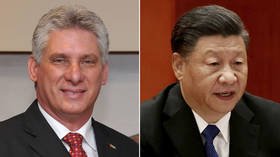Communist nation next door to US is a natural ally for China

China’s turn to Cuba is as strategic as it is logical, since the economic and geopolitical rivalry between Beijing and Washington is only increasing.
On December 25, China and Cuba signed a cooperation plan for joint promotion of the China-proposed Belt and Road Initiative (BRI).
Although Havana was already part of the initiative on paper, the new agreement is significant, according to the Global Times, as it “clarified the key cooperation content and projects for China and Cuba under the BRI including infrastructure, technology, culture, education, tourism, energy, communications and biotechnology.” In other words, it seeks to establish a definitive roadmap as to where China-Cuba economic ties will now go and is described in the same article as “a milestone in bilateral economic relations in 2021.”
This comes amid a growing fallout in relations with the United States, which has escalated an economic campaign with a view to try and contain China. Just recently, President Joe Biden signed a bill to ban all imports from the region of Xinjiang over allegations of forced labour.
In such an environment, it may be said that history ultimately repeats itself. Although Beijing is not pursuing military cooperation with Cuba in the way the Soviet Union did, it is nonetheless doubling down on its relationship with the island for similar strategic reasons. Cuba is the most appropriately suited ideological and well-placed geographic counterweight to the United States possible. A communist state which sits on America’s doorstep, which Washington scathingly disapproves of and has devoted decades worth of efforts in terms of sanctions and pressure to get rid of, Cuba becomes a natural, reliable, and essential partner in a ‘geopolitical competition’ that Beijing officials increasingly publicly embrace.
The goal here is not to place nuclear missiles onto the island and create a crisis and standoff like in the 1960s, but to seek its economic empowerment on the logic that Cuba’s own success and development becomes logically detrimental to American power and dominance, a strategic check on the US, so to speak. As the Global Times article notes: “China is actively maintaining the normal order of international relations and striving to promote common development across the world, unlike the US, which, under the banner of democracy, has imposed an economic embargo on.”
China’s attitude towards the US didn’t use to be this way, and that itself is a connotation of a changing world. Whilst the China-Cuba relationship has a deep-rooted history stemming from the first Cold War, it was in the decades afterwards that Beijing pursued a much more cautious foreign policy, one that was tailored towards not upsetting the United States and initiating a bid towards its own containment too early. Commencing in the Deng Xiaoping era, this strategy was known in Chinese as ‘tao guang yang hui’, or ‘hiding low’ and keeping quiet on the world stage. It was the hallmark of a China that was a lot poorer and less developed than now, recognizing that economic development had to come first above all in the window that was available.
In doing so, Beijing was overly diplomatically conciliatory towards Washington, especially when it was at the peak of its power after the collapse of the USSR. As examples of this restrained approach, China shunned North Korea for over a decade as it courted Seoul, refused to get in the way of the Gulf War, and was more earnest to cooperate with American interests on subjects such as Iran. In other words, the strategic objective was ‘not to get in the way of US foreign policy’, and it was only until the Obama presidency that this attitude slowly began to shift, as China and the ‘pivot to Asia’ came onto the agenda.
Yet it was only in the past two years that outright ‘strategic competition’ consolidated as the new reality. Following the Trump administration’s aggressive turn against China and Biden’s embracing of it, Beijing seemingly accepted this for what it was rather than attempting to change it back. In doing so, China has increasingly shown a willingness to double down on ties with countries also facing opposition or challenges from the US, as opposed to previously either subtly supporting or appearing to be neutral. It has become, across the board, less willing to be deterred or respectful of American unilateral sanctions, and is increasingly offering help to countries as a means to offset the impact of sanctions as well.
In 2021 alone, China’s diplomatic activities in this field have included a new strategic partnership with Iran, its foreign minister’s first post-war visit to Syria and a pledge to deepen economic ties, a vastly expanded partnership with Russia, and now a commitment to deepen economic ties with Cuba.
China is working hard to establish new opportunities for itself beyond Western markets, utilizing the BRI as a vehicle for mutual development and economic integration. Some of the resources that Cuba offers are also of critical strategic importance to China. As Chinese expert Zhou Zhiwei told the Global Times, “Cuba is rich in mineral and oil resources, and is a major source of nickel ore for China. The country also has large potential for development in agriculture and tourism.”
In summary, China’s turn to Cuba is as strategic as it is logical. Whilst Beijing has no aspirations for an ideological struggle across the Americas in the way the USSR did, Cuba’s own standing as a fellow communist state nonetheless stands for it to become an intrinsic partner in Beijing’s rivalry with the United States, taking a position as a country which is seen as trustworthy, supportive, reliable, and also a thorn in Washington’s side.
China will be looking to benefit from trade and investment with Cuba, all with the added bonus of physically undermining Washington’s economic containment of the island. China’s economic ties with Cuba in the long run might cause problems for the US.
The statements, views and opinions expressed in this column are solely those of the author and do not necessarily represent those of RT.















